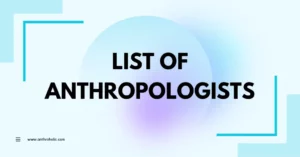AI Answer Evaluation Platform Live Now. Try Free Answer Evaluation Now
Catherine L. Besteman
In an era when anthropology is increasingly called upon to engage with real-world crises, Catherine L. Besteman has emerged as a leading voice in making the discipline matter beyond academia.
From her early fieldwork in Somalia to her more recent work on refugee resettlement, incarceration, and global inequality, Besteman has spent her career asking hard questions: Who gets to belong? Who gets displaced? And how can anthropology help dismantle structures of violence and exclusion?

Currently a professor at Colby College, Besteman is renowned for her sharp analyses of global power, but also for her commitment to public-facing anthropology-whether through museum exhibitions, community partnerships, or accessible writing. Her work on Somali Bantu refugees, post-apartheid South Africa, and the militarization of borders has helped redefine what anthropologists do-and who they do it for.
Early Life and Education
Catherine Besteman was born in the United States and grew up in a globally conscious family that nurtured her interest in cultural difference and social justice. While specific details of her early upbringing are limited in public sources, her academic path reveals a consistent and deepening focus on human rights, inequality, and global systems of power.
She earned her bachelor’s degree at Amherst College, where she was exposed to liberal arts approaches that encouraged critical thinking across disciplines. From there, she pursued graduate work at the University of Arizona, earning her Ph.D. in Anthropology in the early 1990s.
Her dissertation research would take her to southern Somalia, where she conducted immersive fieldwork in the village of Banta. That experience would not only shape her first major publication-it would also resurface years later in unexpected and profoundly personal ways, after civil war forced her former research participants to flee Somalia and resettle in the U.S.
Academic Career and Fieldwork
Besteman began her teaching career at Queens College (CUNY) and later joined the faculty at Colby College in Maine, where she remains a Francis F. Bartlett and Ruth K. Bartlett Professor of Anthropology. Over time, her scholarship evolved from local ethnography to global analyses of power, violence, and mobility, all rooted in deep ethnographic engagement.
Her early research in Somalia offered a rare, on-the-ground look at village life just before the outbreak of civil war. In her acclaimed book Unraveling Somalia (1999), she traced how land disputes, state failure, and class conflict contributed to the country’s descent into chaos. Unlike many external analyses, Besteman’s account was ethnographic, nuanced, and deeply human.
Following her work in Somalia, she shifted her focus to post-apartheid South Africa, where she explored how racial inequalities persisted in the post-liberation era. Her fieldwork in Cape Town culminated in the book Transforming Cape Town (2008), which examined the limits of reconciliation in an urban landscape still scarred by segregation.
Throughout her career, Besteman has maintained a dual commitment: rigorous anthropological scholarship and a moral obligation to address the consequences of injustice.
Major Publications and Contributions
Catherine Besteman’s body of work is defined by deep field engagement, theoretical clarity, and an unwavering focus on the structural causes of displacement and inequality.
Her landmark book Unraveling Somalia: Race, Class, and the Legacy of Slavery (1999) examined how clan conflict, class divisions, and colonial legacies contributed to the fragmentation of Somali society. This ethnographic work stood out for linking micro-level social dynamics with broader national and global forces-a theme that would characterize much of her later scholarship.
Years after her initial fieldwork, Besteman reconnected with her former Somali interlocutors-this time in Lewiston, Maine, where many Somali Bantu refugees had resettled after fleeing the civil war. This reunion inspired Making Refuge: Somali Bantu Refugees and Lewiston, Maine (2016), a moving and incisive book that explores the long arc of displacement and resettlement. Besteman challenges stereotypes about refugees and highlights the bureaucratic, racial, and economic challenges they face in host societies.
In 2020, she published Militarized Global Apartheid, which expanded her focus to a global scale. In it, Besteman argues that the modern world is structured by a system of global apartheid, where mobility, security, and opportunity are divided along lines of nationality, race, and class. It’s a sweeping critique of border regimes, militarization, and the commodification of human life-a culmination of decades of engaged anthropological thought.
Public Engagement and Initiatives
Beyond academia, Catherine Besteman has actively worked to bridge scholarly research with public discourse. She co-curated Making Migration Visible, a 2018 art exhibition in Portland, Maine, that brought together artists and activists to challenge dominant narratives about migrants and refugees. The exhibit reached thousands and sparked widespread community dialogue.
In 2021, she launched the Freedom & Captivity initiative, a Maine-based public humanities project that explores abolitionist visions for the future through art, storytelling, and education. The project brings together incarcerated people, artists, and scholars to confront the U.S. carceral system and imagine alternatives rooted in justice and healing.
Through these efforts, Besteman embodies the spirit of public anthropology-using ethnographic insight not only to understand the world, but to change it.
Anthropology as a Tool for Justice
Catherine L. Besteman has consistently pushed the boundaries of what anthropology can be-and who it can serve. From Somali villages to U.S. refugee communities, from post-apartheid cities to carceral states, her work is rooted in a simple but powerful belief: anthropology must speak to the realities of inequality, displacement, and power.
She has helped redefine the discipline by weaving together rigorous ethnography, public engagement, and activist scholarship. Through both her publications and community projects, Besteman has built a model for anthropology that is as intellectually serious as it is morally committed.
Her legacy lies not only in the books she’s written or the awards she’s earned, but in the lives she’s impacted-students, collaborators, refugees, and readers-who come away from her work with a clearer understanding of the global structures that shape human possibility.
In a world increasingly divided by borders, Besteman reminds us that anthropology’s true purpose is to cross them-not just in theory, but in solidarity.
References
- “Catherine Besteman,” World Peace Foundation. https://worldpeacefoundation.org/team-member/catherine-besteman/
- “Catherine Besteman,” Open Society Foundations. https://www.opensocietyfoundations.org/fellows/catherine-besteman
- “An Interview with Catherine Besteman, 2022 Public Anthropologist Award Recipient,” PoLAR: Political and Legal Anthropology Review. https://polarjournal.org/2022/04/13/an-interview-with-catherine-besteman-2022-public-anthropologist-award-recipient/
- “Catherine Besteman,” Guggenheim Fellowship. https://www.gf.org/fellows/catherine-besteman/
- “Catherine Besteman,” ACLS. https://www.acls.org/fellow-grantees/catherine-besteman/
- “Catherine Besteman,” IPEV – FMSH. https://www.ipev-fmsh.org/expert/catherine-besteman/




